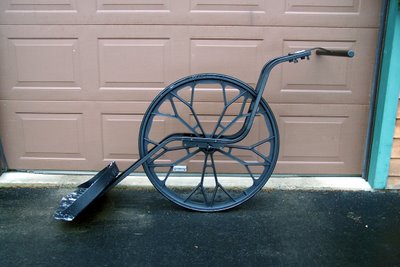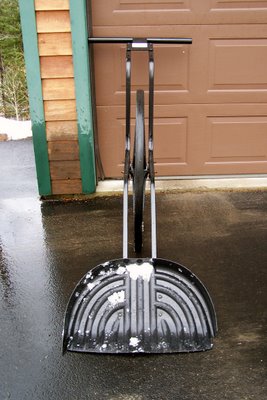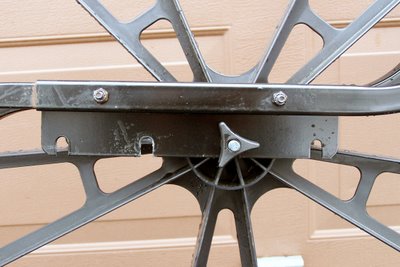
[Photo from Mt. Pisgah Website]
There is a really good article about the history of
Mt. Pisgah in
todays Press Republican. The whole article is posted below because I don't want to lose it.
Mt. Pisgah is a very, very special place to thousands of people. I started skiing there in 1955 (56?) when I was in first grade at
St. Bernards School. At that time and for some years after, the Village of SL was offering free ski lessons to all school children. You would get picked up after school, in a school bus, your skis would be thrown into a village dump truck and off you would go. And yes, Natalie LeDuc was my ski instructor.
I had a pair of Northwood skis with no metal edges and bare wood bottoms, cable bindings with no quick release. Wax was the rule of the day. The baskets on my ski poles were the size of dinner plates. At that time Mt. Pisgah had a rope tow on the left side of the mountain (no longer there) and a longer rope tow that went to the top of the mountain. If I remember correctly the longer rope tow was actually two rope tows. One took you half way up and the second took you the rest of the way up. A T bar was installed before I ever got to try the "big" rope tow. It took a fair amount of strenght to lift the rope and often two or three of us would go up spaced closely together to make lifting the rope a bit easier. I spent every weekend skiing at Mt. Pisgah. Like the article said, your parents would drop you off in the morning and pick you up at night.
From middle school until high school graduation we skied every night til 10 PM and every weekend from morning til night. A seasons pass was only $5. You had to have the right equipment too. Henke boots, Kastle skis (although Head would be ok and if you were really different Hart) and marker bindings (with long thongs).
Ski historian Natalie Leduc recollects years of memories
By: KIM SMITH DEDAM
Staff Writer
December 31, 2006
SARANAC LAKE — It was a tow rope hooked to an old ambulance engine tugging skiers to the top of one of the first ski areas in Saranac Lake.
They drove it up Mount Dewey by the time snow flew.
But that was before Skyview and its progeny Mount Pisgah, if ski areas have lives — which some say they do as the sweep of a thousand runs breathes life into bodies careening down a white mountain slope under sapphire skies or a dizzying fluster of downy flakes.
Natalie Leduc, a world-renowned ski historian who lives beside Mt. Pisgah, taught thousands to ski in over 50 years.
She raced these hills early on, through high school and college — with the boys' team. It was almost before girls skied.
A sequence of photos in her tidy basement turned ski history center — stacked to the ceiling with books, photos and memorabilia — pretty much tells it all.
"That is my mother skiing pregnant with me," Leduc pointed and paused.
"And that's me in the backpack," she said of the next frame.
The photo shows a tiny child bundled up looking casually over a mother's shoulder.
"And there I am, the next year, on skis."
At about age 2, barely walking, she dared resist gravity.
Leduc is quick to cherish the power of a human spirit on skis; the very thought of the familiar tug of a rope tow on snow-crusted woolen mittens makes her smile.
"Oh, it was such a great joy, great joy, and freedom."
Kids used to flock to the rope tow on the early hills as soon as they got up in the morning or once school let out, she said. Their shouts of excitement steamed in the cold air.
"And you could go without your parents," Leduc said.
A kind of chivalry emerged among young skiers when boys showed maybe-sweethearts how to grapple the rope, wrapping two arms around the girl and holding on for dear life as the yank tugged them together.
Some capricious children skied way out of the tow-line tracks and snapped the rope back sending some buddy behind them, and sometimes the whole rope, twanging off the line and pulleys.
Leduc laughed and pulled a binder from a central row on the bookshelves.
Her chronicles tell the entire history of skiing dating back to the earliest days in Scandinavia when it was mostly a mode of travel.
"Here, you'll really love this," she said.
The story in four thin, single-spaced, hand-typed pages written by Curt Wamsganz tells how he created the first incarnation of a ski tow that later moved to Mount Pisgah.
"In September of 1946," he wrote at Leduc's request in the 1970s, "my brother Raymond 'Pappy,' Joe Perry and myself decided to build a ski tow."
It was an adventure carved out of cow pasture under cold starry skies on a hill owned by Martin Donnelly.
They put ski slopes in place on a "permanent basis" by clearing the hill with an axe and a two-man crosscut saw.
To operate the rope tow, they found a 1936 Ford V-8 motor in a farmer's field in Vermontville and overhauled it one sprocket at a time.
"All of this," he wrote, "had to be performed at night from 6:30 till about ten, then off to Durgan's or the Belvedere for a nite cap."
They built a motor shack and a ticket booth and set "rejected" telephone poles donated by Jim Tanzini into hand-dug holes.
But to make the "special order" ski tow rope into one continuous 2,000-foot loop was another feat.
"Managed to find a Norwegian sailor sent here with others in 1945 to cure T.B.," Wamsganz wrote.
"We all went up one nite in late November, fortified with two bottles of Black Velvet ... Started about 8 p.m. to lay back and unwind 100's of individual strands, by midnight he had finished making a 25-foot splice that was almost impossible to detect. The end of November was bitter cold and at 5 below zero with his hands ungloved our Norwegian friend had made a minor miracle, the spliced rope glided over the drive wheels nice and smooth."
The grand opening at Skyview on Christmas Day was crowded, he said, with all kinds of local people: "doctors, lawyers, dentists, teachers, one minister, college students plus a gang of high school guys and gals."
And when traffic backed up, Wamsganz solved the problem by trading a friend who ran a highway plow a bottle of Black Velvet for plowing parking space on each side of the road for a quarter mile.
The season went on.
"Lawsuits? Never heard of them," he wrote. "Standard procedure ask Dr. Murphy don't move him or her go down and bring up a toboggan" and put them into the back of a "real wood trim station wagon toboggan and all."
It only happened a few times.
That tow ran from Christmas 1946 until April of 1950, when Mount Pisgah was "getting better developed every year under Tom Cantwell, Bob DeMerse and others.
"Whiteface Mountain had opened their new location on the Wilmington notch road where we used to cross a little foot bridge and climb all day to get one ski run down, FALLING MOST OF the way."
So when then Saranac Lake village manager Frank Buck Sr. offered the Wamsganz boys $300 for the specially-made ski motor and hand-spliced rope, they accepted.
"To this day," Wamsganz wrote, "there is a little bit of Skyview Ski Ctr. left. Every time you go out to Donnelly's in the summer to get one of their famous ice cream cones you step into what was once our warm up hut."
And Pisgah was born of that same spliced-seamless rope.
Leduc shook her head chuckling, and opened other pages of raw history.
"On November 15, 1948, the village board held a discussion on the possibility of a lease" for property on a potato farm — then called Trudeau Hill because the sanatorium, now American Management Association, Leduc said, was just over the hill.
Exactly one day later (Nov. 16) the lease was signed and the ski tow equipment from Skyview was moved to Mt. Pisgah.
"The first 32 days took in $564.53 with expenses of $421.68. The village ski center was off and running."
That first year, Leduc said, reaching again for a binder packed full of page protectors, had a special consignment.
She pulled another hand typed letter from Alice DeMerse O'Hare, who, as a young woman, bought the first concession at Mt. Pisgah for $15.
"Pisgah was always more than just a ski hill, it belonged to the people and they really enjoyed it," O'Hare declared in her letter. "The whole town would come up for lunch."
O'Hare chronicled her day and her mother's while they made hot chocolate and fresh sandwiches in two trips back to town daily to keep food supplies fresh.
But from among the pressed typewritten pages, Leduc pulled a recipe for Mt. Pisgah Ski Cake, originally "Dougal Cake" from "Mom" Demers — named Ski Cake in 1940.
"Note," the recipe says, "may be frozen in squares and wrapped individually. Keeps well. This cake was cooked on an old type stove, therefore, be careful not to over cook on hotter modern stoves."
Indeed.
Leduc smiled and copied the recipe.
"The 1950s and 60s found the Saranac Ski Club very active at Mt. Pisgah conducting picnics, clinics, obstacle races, work sessions, collegiate high school races among other activities.
"From 1952 to 1969, the Saranac Lake School System provided free ski instruction and transportation for every child attending grades 2 to 8. It was one of the earliest programs of this kind conducted in the East. Each school was given its 'own day' and classes were held five days a week under Natalie Bombard Corl Leduc, a local PSIA Certified Instructor."
Leduc looked up and chuckled at the thought of children holding on for the first time.
"The rope tow was long. Someone had to get in front and hold it up for you."
But the countless red-cheeked faces, many of whom she recalls today, couldn't wait for their day at Mt. Pisgah.
"They would bring up five or six elementary school classes and put all their skis in the truck and take them out and line them up for the children. It was amazing. We had quite a few kids without skis, but we had extras in a closet and each kid knew which pair was theirs.
"What wonderful times those were," she said. "It's remained an ideal hill all these years."
And so, from the whir of a flywheel turning magical seamless rope to the clean sassy twirl of a t-bar lift, the ski area brings multitudes of people, young and old, to love the white-covered winter Adirondack landscape.
Kareen Tyler, Saranac Lake village clerk and president of the Saranac Lake Ski Club, names the various bands of dedicated people who coordinate events and take care of the mountainside.
Friends of Mount Pisgah, NYSEF training and races, the village board, the ski club and the flocks of young people who still bundle up and flock to the slope for ski and snowboard lessons nearly every day of the week.
Tyler's eyes brighten knowing how central the wintry slope is to a town and the woman who trained generations to ski.
"She's unbelievable," Tyler said of Leduc, and grinned knowing how much the mountain gives the village every year when weather cooperates.
And how hard the grooming crew works when it doesn't.
"It's a part of us all."







